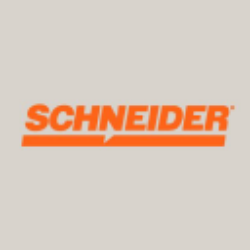
FMP

Schneider National, Inc.
SNDR
NYSE
Schneider National, Inc., together with its subsidiaries, provides surface transportation and logistics solutions in the United States, Canada, and Mexico. The company operates through three segments: Truckload, Intermodal, and Logistics. The Truckload segment offers standard long-haul and regional shipping services primarily through dry van, bulk, temperature-controlled, and flat-bed equipment, as well as cross dock and customized solutions for time-sensitive loads. The Intermodal segment provides door-to-door container on flat car services, including rail and dray transportation through company-owned containers, chassis, and trucks. The Logistics segment offers freight brokerage, supply chain, and import/export services; value-added services to manage and move its customers' freight; and transloading and warehousing services. It also leases equipment, such as trucks to owner-operators; and provides insurance for the company drivers and owner-operators. Schneider National, Inc. was founded in 1935 and is headquartered in Green Bay, Wisconsin.
21.35 USD
0.04 (0.187%)
DuPont Analysis
The DuPont analysis, pioneered by the DuPont Corporation, offers a structured approach to assessing fundamental performance. It involves breaking down the return on equity (ROE) into various components, aiding investors in comprehending the factors influencing a company's returns.
ROE = Net Income / Average Total Equity
ROE = (Net Income / Sales) * (Revenue / Average Total Assets) * (Average Total Assets / Average Total Equity)
The company's tax burden is (Net income ÷ Pretax profit). This is the proportion of the company's profits retained after paying income taxes. [NI/EBT] The company's interest burden is (Pretax income ÷ EBIT). This will be 1.00 for a firm with no debt or financial leverage. [EBT/EBIT] The company's operating income margin or return on sales (ROS) is (EBIT ÷ Revenue). This is the operating income per dollar of sales. [EBIT/Revenue] The company's asset turnover (ATO) is (Revenue ÷ Average Total Assets). The company's equity multiplier is (Average Total Assets ÷ Average Total Equity). This is a measure of financial leverage. Profitability (measured by profit margin) Asset efficiency (measured by asset turnover) Financial leverage (measured by equity multiplier)